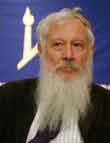Robert Aumann

(1930 - )
Robert J. Aumann, was in
born 1930 in Frankfurt, Germany (Israeli and U.S. citizen). He received a
Ph.D in mathematics in 1955 from the Massachusetts
Institute of Technology (MIT), Cambridge,
MA, USA. He is currently a professor at
the Center for Rationality, Hebrew
University of Jerusalem, Israel.
He shared the 2005 Nobel Prize for Economics
with Thomas C. Schelling of the University
of Maryland.
The following press release
from the Royal Swedish Academy of Sciences
describes Aumann's work:
In many real-world situations, cooperation may be easier
to sustain in a long-term relationship than in a single
encounter. Analyses of short-run games are, thus, often
too restrictive. Robert Aumann was the first to conduct
a full-fledged formal analysis of so-called infinitely
repeated games. His research identified exactly what
outcomes can be upheld over time in long-run relations.
The theory of repeated
games enhances our understanding of the
prerequisites for cooperation: Why it is
more difficult when there are many participants,
when they interact infrequently, when interaction
is likely to be broken off, when the time
horizon is short or when others' actions
cannot be clearly observed. Insights into
these issues help explain economic conflicts
such as price wars and trade wars, as well
as why some communities are more successful
than others in managing common-pool resources.
The repeated-games approach clarifies the
raison d’être of many institutions,
ranging from merchant guilds and organized
crime to wage negotiations and international
trade agreements.
Sources: Nobelprize.org,
Picture courtesy of Hebrew
University and Sasson
Tiram |